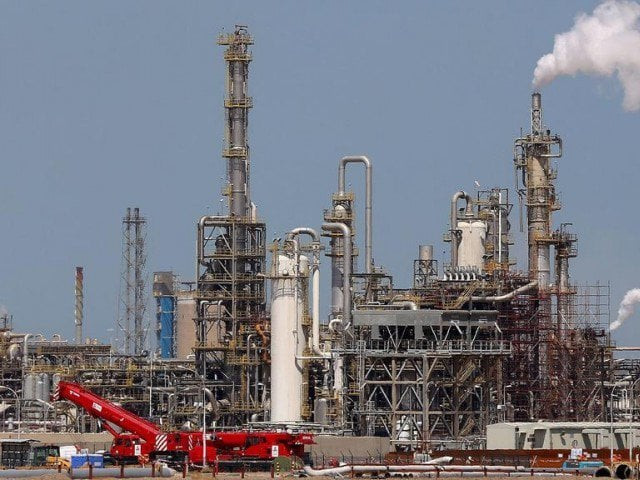Oil refineries get entangled in ‘worst’ operational crisis
Storages are filled to capacity following excessive oil, LNG imports

An oil refinery. PHOTO: AFP
The refineries, which meet 30% of the country’s needs, are feeling suffocated following excessive imports of furnace oil and liquefied natural gas (LNG) to run power plants.
With these imports, almost all the oil storage facilities in the country are filled to capacity, including those maintained by the state-owned Pakistan State Oil (PSO). This glut has virtually closed down the refineries.
Despite the grave situation, the government has continued to allow furnace oil and LNG imports instead of reviewing its policy in order to give some space to the domestic refineries.
To the relief of refineries, oil-fired power plants resume production
“The laws (licensing rules for oil marketing companies) strictly bind oil marketing companies to first lift locally produced petroleum products…and they will have to take NOC (no-objection certificate) from refineries for imports - if necessary,” an industry official claimed, adding the rules were being violated since long.
The crisis erupted especially after Prime Minister Shahid Khaqan Abbasi ordered immediate closure of eight furnace oil-based power plants of over 4,000 megawatts with the start of coal and LNG-based plants of over 5,000 megawatts by the end of October 2017.
Later in December, the government allowed resumption of work by some furnace oil-based power plants - including two big plants Hub Power and Kot Addu - but they were told to consume only imported furnace oil and not the domestic fuel.
“Refineries have reduced furnace oil price by up to Rs10,000 per ton, but power plants are forced to consume only expensive imported furnace oil. The logic is beyond comprehension,” the industry official remarked.
According to him, other oil-based plants have also resumed production, but are running at extremely low efficiency level of 1% to avert power outages, which had emerged soon after the closure of the eight plants.
“All oil storages and bowsers (tankers) are brimming with furnace oil while the pipelines (used to transport oil from the refineries to power plants) are choked with oil,” he said.
“We (refineries) may return to normal operations if the government orders resumption of power production (at full capacity) at all the eight furnace oil-based plants for only one month,” another refinery official claimed.
“The government (PM Abbasi) has stated it will phase out all the furnace oil-based plants to protect environment, but it forgets that it has licensed many coal-fired power plants which is the dirtiest fuel,” he said.
He made it clear that refineries had no issues if the government wanted to close oil-based power plants, but it should do proper planning and take all the industries on board.
OGRA proposes Rs1.48 per litre increase in petrol price
“The virtual closure of the refineries has started creating shortage of petroleum products including jet fuel (JP-1), diesel and motor gasoline (petrol),” he said.
In the latest decision, the government has imported jet fuel and started supplying it to airports to avert any crisis.
“PSO has imported 10,000 tons of jet fuel last week and another vessel carrying the same quantity will reach Karachi Port tonight (the night between Tuesday and Wednesday),” a PSO official confirmed.
The time is not far away when the country will be facing diesel and petrol shortages as well. “Some of the small oil marketing companies have already been facing shortage at fuel pumps,” he said.
Published in The Express Tribune, December 20th, 2017.
Like Business on Facebook, follow @TribuneBiz on Twitter to stay informed and join in the conversation.



















COMMENTS
Comments are moderated and generally will be posted if they are on-topic and not abusive.
For more information, please see our Comments FAQ